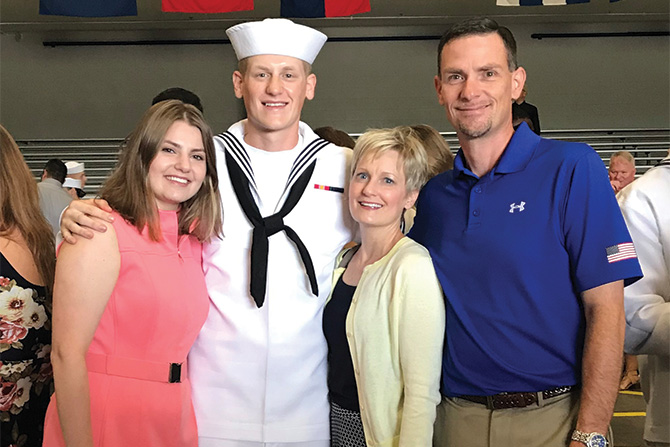By The West Virginia Bankers Association
How did you become a banker?
I worked for about five years for the Farmers Home Administration, with my last position being the community development manager in Parkersburg. I was responsible for a five-county area. In 1996, after the birth of our son, we decided to move closer to my wife’s family in Petersburg, so I applied with various banks in the area, as my primary responsibilities with FmHA were in lending. I ended up going to work for Grant County Bank in October that year as a collector.
Are there any individuals who had a major impact on your career?
It’s difficult to single out individuals as so many along the way helped shape my career, but I would single out Butch Porter, Virgil Smyer and Gerald Sites here at the bank and Joe McMillion with USDA. I learned a lot from each of them. I also have to give credit to my good friend Alan Harris who convinced me to intern with FmHA for a couple of summers, and that really started me down the path that led to where I am now.
What is the best advice you’ve received so far in your banking career?
Surround yourself with good people. They will make your job much easier and make the organization and you look good without you having to do all of the work yourself.
What is the most rewarding part of your career?
For me, the most rewarding part of my career was probably when I was a loan officer. I distinctly recall making several young couples their first home loan, and while I’ve had other satisfying moments in my career, I’m not sure it gets any more rewarding than that feeling.
What do you think will be some of the dominant trends within the banking industry in the next
5-10 years?
The two trends that I believe will continue are related and are the continued push to get bigger and more efficient and the move to a more digital banking experience. The big banks such as Bank of America/Wells Fargo/Chase will continue to grow because they can spend billions of dollars on technology research and attract customers who increasingly want the ability to do all of their banking remotely. This will continue to incentivize banks to merge to be more efficient and competitive in the digital realm.
Why is being a West Virginia Banker member important?
As community banks get squeezed by credit unions on one side and mega-banks on the other, the only chance we have to survive is to band together to make our voices heard. WVBA is the organization that can coordinate and help shepherd all of our voices into one strong chorus that will get the attention of lawmakers at the state and national levels. What makes it beneficial? Beyond the political aspect, there are many other benefits that banks enjoy by being members of the WVBA. The ability to have a curated list of vendors that have been vetted by the WVBA is helpful when looking for a new product or to replace an existing vendor or product. Educational schools and seminars are another significant benefits of membership. The ability to have a well educated and informed workforce is critical to our success as a bank, and we rely on WVBA for a lot of those needs.
How long have you been active in the West Virginia Bankers Association?
I’ve really only been active since I became CEO in 2011. My activity up to that point consisted mainly of attending various seminars and schools.
What are you looking forward to most as the West Virginia chairman?
The opportunity to work with bankers around the state — bankers’ in West Virginia are a wonderful group of people who really want to do what is best for their community and work hard every day to make good things happen.
What advice would you give emerging leaders in the banking industry?
Be open-minded and willing to adapt. A good leader is able to set his own thoughts aside and truly listen to the ideas of others.
What is a favorite memory or experience of your career?
One of my favorite memories actually came last year when a severe storm caused major flooding in and around the small town of Harman in Randolph County. We assembled a team of volunteers from the bank and spent three days helping shovel mud and water out of basements, clean houses, and carry debris out of yards and just assisting people with whatever they happened to need. We also donated cleaning supplies and dehumidifiers to help with the relief effort. People were sincerely appreciative, and being able to help out and give back was very gratifying.
What is something about you that might surprise fellow bankers?
I grew up in a home without electricity for most of my childhood. While I didn’t always appreciate it then, I was able to have life experiences that were much more in line with what most bankers grandparents or great-grandparents might have experienced. I’ve read by kerosene lamp, cultivated behind a horse, made molasses, grown tobacco, milked cows by hand, butchered hogs, and done many things that were common to most West Virginians a hundred years ago.
Please tell us about your family, interests and hobbies.
My wife and I have two children, ages 22 and 24. My son graduated from Liberty University and enlisted in the Navy last year. He is currently deployed on the USS Philippine Sea, a guided-missile cruiser based in Mayport, Florida. My daughter graduated last year from Fairmont University and is currently in her first year of law school at Belmont University in Nashville. I enjoy playing golf and backpacking. In the last two years I’ve spent the week after the Banking convention backpacking. It’s a great way to burn off the extra pounds gained from all of the great food at the Greenbrier! I am going to try my hand at bike packing this fall if all goes well. My plan is to ride from Davis to Lewisburg by piecing together three rail-trails along with some back roads.
What advice would you give someone entering the banking industry today:
There is no substitute for hard work and no shortcut to success. The best way to advance your career is to bloom where you are planted. Do the best job you can, regardless of your position, and those above you will notice.
By The West Virginia Bankers Association
This story appears in Issue 3 2020 of the West Virginia Banker Magazine.







